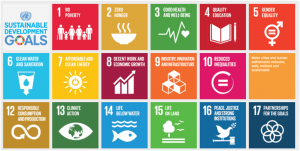by Joseph Hirst
As a Geography BSc undergraduate, the natural environment holds a very important place in my heart. I wouldn’t study it otherwise! This love for the environment isn’t recent either- I was part of my secondary school’s environment team throughout my time there (including 6th form). It was no real surprise to see that I’d join the Geography Department Sustainability Champions team at King’s when I heard about its existence. Given my history, I was surprised to hear that much of the work of the sustainability champions scheme focused on the sustainable development goals, something I knew little about! These goals aren’t explicitly taught in the Geography BSc but, as I grew to learn, these goals are incredibly important for everyone – from the international community to a single undergraduate student.
So, what are exactly are the sustainable development goals? At the start of King’s Sustainability Week 2018, this is a good time to answer that question. Put simply, they are a number of internationally agreed objectives to be achieved by 2030. These goals were set up by the United Nations in 2015 in order to focus their efforts during the next 15 years. These goals followed the famous millenium development goals, and were specifically created in relation to their successes and failures. These 17 goals are:
1. End poverty in all its forms everywhere
2. End hunger, achieve food security and improved nutrition and promote sustainable agriculture
3. Ensure healthy lives and promote well-being for all at all ages
4. Ensure inclusive and equitable quality education and promote lifelong learning opportunities for all
5. Achieve gender equality and empower all women and girls
6. Ensure availability and sustainable management of water and sanitation for all
7. Ensure access to affordable, reliable, sustainable and modern energy for all
8. Promote sustained, inclusive and sustainable economic growth, full and productive employment and decent work for all
9. Build resilient infrastructure, promote inclusive and sustainable industrialisation and foster innovation
10. Reduce inequality within and among countries
11. Make cities and human settlements inclusive, safe, resilient and sustainable
12. Ensure sustainable consumption and production patterns
13. Take urgent action to combat climate change and its impacts
14. Conserve and sustainable use the oceans, seas and marine resources for sustainable development
15. Protect, restore and promote sustainable use of terrestrial ecosystems, sustainably manage forests, combat desertification, and halt and reverse land degradation and halt biodiversity loss
16. Promote peaceful and inclusive societies for sustainable development, provide access to justice for all and build effective, accountable and inclusive institutions at all levels
17. Strengthen the means of implementation and revitalise the global partnership for sustainable development
All of which are a lot easier to say than put into practice! Despite the optimism of achievable goals (and they are achievable), it will take a monumental amount of effort. This doesn’t just include communities at an international scale either, it’s going to take a lot of effort from all of us. It extends to regional governments, institutions like King’s, and of course each and every individual to make such an achievement possible. With that said, there is a big problem…
The Sustainable Development Goals aren’t widespread knowledge!
Sounds crazy, but it’s true. You only need to take a look at the figures:

Source: Hudson & van Heerde-Hudson (2016). Data presented by Devcom (2017)
Although this data is from 2015, the number of people that haven’t even heard of the sustainable development goals before is shocking. What’s worse is that not only are there going to be people who report that they know the goals better than they really do, but these are actually an improvement on the millennium development goals! These goals are vital to international development plans for the next decade, including the UK, and yet relatively few people even know about them.
There is however some good news – you now know about their existence! These goals apply and matter to everyone, because they’re going to take effort from all of us to achieve. There’s a really easy way for you to help us achieve them to. Simply by knowing and spreading knowledge of their existence, you’re helping us raise awareness. If you wanted, you could go a stage further and actively participate in activities to help achieve the goals. That can be small everyday things from switching lights off when you’re not using them, taking part in the free activities of Sustainability Week or to joining groups focused on improving sustainability (like, for example, King’s Sustainability Champions!). Each individual action starts to add up to make a big difference, and it’s the only way we’re going to be able to achieve these goals.
If you’d like to read more about the sustainable development goals, or share them around, you can click this link here. The full timetable for King’s Sustainability Week can be found here.
Devcom (2017) What People Know and Think About the Sustainable Development Goals: Selected Findings from Public Opinion Surveys [ONLINE] Available at: https://www.oecd.org/development/pgd/International_Survey_Data_DevCom_June%202017.pdf
Hudson & vanHeerde-Hudson (2016); survey of 6,000-8,000 individuals in France, Germany, UK & US. (Fieldwork: YouGov, 12/2015)
Hi Michael Farrant
Why is the Land Registry important?
This comment is very useful for law purpose